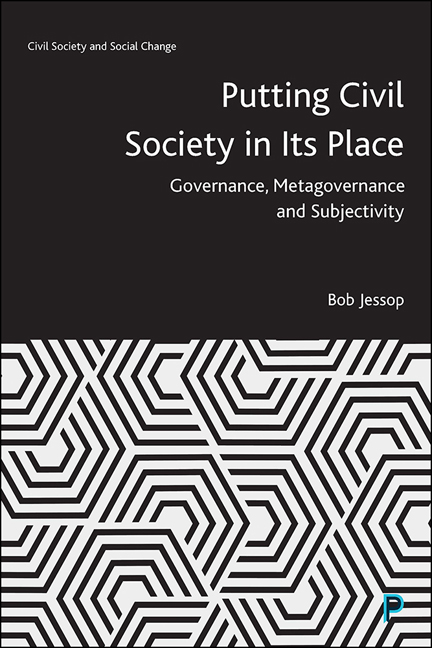Book contents
- Frontmatter
- Dedication
- Contents
- List of Tables and Figures
- Abbreviations
- Note on the Author
- Acknowledgements
- Licensing Information
- Preface
- 1 Introduction
- Part I Complexity, Contingency and Governance
- Part II Locating Civil Society as a Mode of Governance
- Part III Governance Failure and Metagovernance
- Endnotes
- References
- Index
1 - Introduction
Published online by Cambridge University Press: 18 March 2021
- Frontmatter
- Dedication
- Contents
- List of Tables and Figures
- Abbreviations
- Note on the Author
- Acknowledgements
- Licensing Information
- Preface
- 1 Introduction
- Part I Complexity, Contingency and Governance
- Part II Locating Civil Society as a Mode of Governance
- Part III Governance Failure and Metagovernance
- Endnotes
- References
- Index
Summary
This book explores the roles of markets, organizations, networks and solidarity as modes of governance, their respective strengths and weaknesses, and how they are combined and operate in hybrid ways in the real world. Civil society is not the main object of this book, which seeks instead to locate this field of social relations within a governance approach. Civil society can be said to exist at the intersection of networks and solidarity as opposed to markets or command, and its agents have the potential to guide markets and state action. In these terms, civil society may serve as a means of self-responsibilization as well as self-emancipation, and this can be seen in dialogues around the ‘Big Society’, social enterprise, social innovation, the formation of the commons, and so forth, as well as in practices of societal organization in response to disasters and crises. In this regard the governance approach rejects the tripartite classification of market, state and civil society inherited from the Enlightenment in favour of an analysis of hybrid relations of governance.
First comments on civil society
Let me confess that I find ‘civil society’ problematic on conceptual as well as empirical grounds. It is hard to separate ‘civil society’ fully from the economy (which is always socially embedded, although the forms of embeddedness vary) and from the state (defined by Gramsci, for example, as ‘political society + civil society’, 1971: 242; 1975, Q15, §10: 1765). Gramsci added that the state can be understood as ‘[t]he entire complex of practical and theoretical activities with which the ruling class not only justifies and maintains its dominance, but manages to win the consent of those over whom it rules’ (Gramsci, 1971: 244; 1975, Q15, §10). Nicos Poulantzas (1978) developed this idea further when he defined the state as a social relation. This is an elliptical statement that draws on Marx's own statement that capital is not a thing but a social relation between people, established through the instrumentality of things (Marx, 1996 [1883]: 753). For Poulantzas, this meant that state power is a social relation between politically relevant forces mediated through the institutional structure of political society (Poulantzas, 1978: 128–9).
- Type
- Chapter
- Information
- Putting Civil Society in Its PlaceGovernance, Metagovernance and Subjectivity, pp. 1 - 32Publisher: Bristol University PressPrint publication year: 2020



